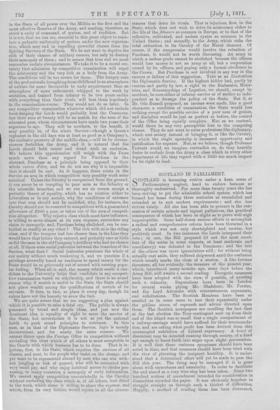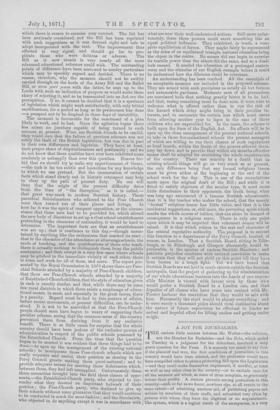SCOTLAND IN PARLIAMENT.
QOOTLAND is becoming restive under a keen sense of Ll Parliamentary neglect, hard to endure because so thoroughly undeserved. For more than twenty years she has been striving to get the admirable school system which has formed her boast during three centuries so remodelled and extended as to suit modern requirements ; and she has striven vainly. All she has been able to procure is the con- cession of certain minute and topical palliatives, the practical consequence of which has been so slight as to prove well-nigh imperceptible. Some half-dozen serious efforts to accomplish a radical and comprehensive reform have been thwarted in a style which was not only shortsighted and unwise, but positively cruel. In two instances the Lords interposed their veto ; in one, the Bill prepared (if not the most excel- lent of the series in some respects, at least moderate and conciliatory) was defeated in the Commons ; and the fate of the,others was more ignominious still ; for without being actually cast aside, they suffered shipwreck amid the confusion which usually marks the close of a session. A like fortune threatens, all too evidently, the measure of the present year, which, introduced many months ago, some days before the Army Bill, still awaits a second reading. Energetic measures have been adopted with the view, if possible, of averting such a calamity. Deputations have been in London for several weeks plying Mr. Gladstone, Mr. Forster, and the Lord Advocate with remonstrances, arguments, and solicitations. The Scottish Members have been so assailed as in some cases to lose their equanimity under the pitiless storm of reproach and advice directed upon them. The Scottish newspapers are recalling the fact that at the last election the Tory contingent sent up from their end of the island was so small that a single compartment of a railway-carriage would have sufficed for their accommoda- tion, and are asking what profit has been derived from this unexampled exhibition of Liberal supremacy. A brool of discontent may be detected running through society, of a kind apt enough to burst forth into anger upon slight provocation. It is well that these ominous symptoms should have been noted in time, and that measures should have been tried with the view of placating the incipient hostility. It is under- stood that a determined effort will yet be made to pass the Bill this year. The thing may be managed if it is gone about with earnestness and unanimity. In order to facilitate the end aimed at a very wise step has been taken. Some two hundred notices of amendment intended for consideration in Committee crowded the paper. It was obviously hopeless to struggle straight on through such a thicket of difficulties. Happily, a method of evading them has been discovered,
which there is reason to surmise may succeed. The list has been anxiously considered, and the Bill has been reprinted with such suggestions as it was deemed right and safe to adopt incorporated with the text. The improvement thus effected is very signal, and should go far to pro- pitiate those who were dubious or adverse. The Bill as it now stands is very nearly all the most advanced educational reformer could wish. The outstanding points of difference have been narrowed to sundry particulars which may be speedily argued and decided. There is no reason, therefore, why the measure should not be swiftly carried through on the heels of the Army Bill and the Ballot Bill, or even pari passu with the latter, be sent up to the Lords with such an indication of purpose as would make them chary of rejecting it, and so be transmuted into an Act ere the prorogation. If so, it cannot be doubted that it is a specimen of legislation which might work satisfactorily, with only trivial modifications, for a period as long as its predecessor has done —a prospect not to be despised in these days of instability.
The moment is favourable for the enactment of a plan likely to work, and to last. Since the agitation began there has arisen no juncture capable of being turned to such account at present. Were our Scottish friends to be candid, they would own that the failure of previous schemes was not solely the fault of the British legislation, but was duo in part to their own differences and bigotries. They have, at least, their proper share of disputatiousness and pertinacity ; and we do not know that these qualities have ever been exhibited more resolutely or unhappily than over this question. Heaven for- bid that we should try to make any apportionment of blame, —the task is far too subtle and hazardous for any knowledge to which we can pretend. But the enumeration of certain facts which stand clearly out in historic retrospect may help to clear up the path of present duty. No one will deny that the origin of the present difficulty dates from the time of " the disruption," as it is called,— that great way-mark in modern Scottish history. Those parochial Schoolmasters who adhered to the Free Church were then turned out of their places and livings. In how far it was the spirit of rampant opposition, or the circum- stance that these men had to be provided for, which stirred the new body of dissenters to set up a rival school establishment pretending to the character of nationality, it would be hard to determine. The important facts are that an establishment was set up ; that it continues to this day,—though unsus- tained by anything like the enthusiasm that marked its start ; that in the character of the attendance at all average schools, the mode of teaching, and the qualifications of those who teach, there is actually nothing to distinguish them from the public seminaries ; and that, except in a very few cases where schools may be pitched in the immediate vicinity of each other, there is room and work for all of them, and more. The report pre- sented by the Royal Commission in 18G9 shows there are Paro- chial Schools attended by a majority of Free-Church children, that there are Free-Church schools attended by a majority of Established-Church children, that the style of education given in each is exactly similar, and that, while there may be some few rural districts in which there exists a surplusage of educa- tional means, in most, and especially in the great towns, there is a paucity. Regard must be had to this posture of affairs, before recent movements, or present difficulties, can be under- stood. It is not to be marvelled at that the Free-Church people should soon have begun to weary of supporting their peculiar scheme, seeing that the common-sense of the country prevented them from deriving from it any exclusive benefit. There is as little cause for surprise that the whole country should have been jealous of the exclusive powers of administration in respect of the public schools possessed by the Established Church. From the time that the question began to be mooted it was evident that three things had to be done,—to open up the management of the existing national schools ; to incorporate those Free-church schools which are really requisite and useful, their position as sharing in the Privy Council grants making them quasi-national ; and to provide adequate means for meeting those deficiencies which, between them, they had left unsupplied. Unfortunately, these three necessities brought into the field three classes of oppo- nents,—the Established-Church party, who objected to sur- render what they deemed an important bulwark of their position ; the Free-Church party, who declined to give up their schools without some guarantee that they would continue to be conducted in much the same fashion ; and the Secularists, who objected to do anything except it was in accordance with what are now their well-understood notions. Still more unfor- tunately, these three powers could exert something like an equal political influence. They exhibited, in truth, a com- plete equilibrium of forces. They might fairly be represented as the sides of an equilateral triangle, national education being the object in the centre. No sooner did one begin to exercise its tractile power than the others did the same, and so a dead- lock ensued. It needed the education of a prolonged contro- versy and the stimulus of our English example before it could be understood how the dilemma could be overcome.
An understanding has been reached. All the essentials of an acceptable measure are included in the proposed scheme. They are armed with such provisions as satisfy all but furious and untameable partizans. Moderate men of all persuasions are convinced both that nothing greatly better is to be had, and that, seeing something must bo done soon, it were wise to welcome what is offered rather than to run the risk of the hazard which delay might bring to their peculiar in terests, and to encounter the certain loss which must ensue from allowing another year to lapse in the case of those children who are unprovided for. In the main, the scheme is built upon the lines of the English Act. Its efforts will be to open up the close management of the present national schools, to take in those denominational schools the present managers of which are willing to run their chance of such regulations as local boards, within the limits of the powers allowed them, may lay down, and to provide that within six months effective means shall be adopted for overtaking the whole requirements of the country. There can scarcely be a doubt that itt existing schools things will go on very much as at present, the only difference being that any formal religious lesson- must be given either at the beginning or the end of the school work for the day. This is one of the emendations made upon the original draft of the Bill ; and while it is fitted to satisfy objectors of the secular type, it need cause little disturbance to their opponents, the truth being, what was long ago announced of a famous Scottish educationist, that it is the teacher who makes the school, that the merely " formal " religious lesson has little value, and that it is the incidental suggestions, or, still more, the pervading spirit which marks the whole course of tuition, that can alone be deemed of consequence in a religious sense. There is only one point upon which it may be expected that vehement demur will be raised. It is that which relates to the seat and character of the central regulative authority. The proposal is to entrust this function to a department of the Privy Council, located, of course, in London. That a Scottish Board, sitting in Edin- burgh, or in Edinburgh and Glasgow alternately, would be preferable, is the opinion of various Scottish Members ; and patriotic prejudice combines with rational conviction to make it certain that they will not yield on this point till they have been beaten in a tough fight. Yet w e have heard that Scottish Boards are not held in much esteem outside the Scottish metropolis, that the project of gathering up the administration of our whole educational business into the hands of one respon sible Minister is viewed with favour even by those who would prefer a Scottish Board to a London one, and that deputies of all classes who have come into contact with Mr. Forster harbour the conviction that they would be safe with him. Necessarily the start would be almost everything ; and it were surely a thousand pities should rival obstinacies about the nature of future supervision be effectual to hinder an united and hopeful effort for lifting anchor and getting under weigh.



































 Previous page
Previous page